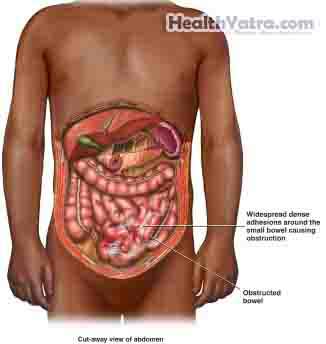Definition
Small bowel obstruction means the small intestine is partially or totally blocked. When this happens, the contents of the intestine cannot properly get out of the body. Stools, fluid, and gas build up inside the intestine. This is a potentially serious condition that requires urgent medical care.
Causes
Bowel obstruction may be caused by a “mechanical” problem. In this case, something inside the body blocks the movement of material through the intestine.
Bowel obstruction can also be caused by an ileus, which is when the bowel itself does not work right. This nonmechanical type of obstruction is called paralytic ileus, or pseudo-obstruction. It is often the cause of obstruction in infants and children.
“Mechanical” small bowel obstruction has many possible causes, including:
- Hernias
- Scar tissue left behind by operations (adhesions)
- Gallstones (rarely)
- Crohn’s disease (an inflammatory bowel condition)
- Small bowel tumor
- Abnormal growth of tissue adjacent to the small bowel
- Folding in the wall of the intestine ( intussusception)
- Twisted intestine (volvulus)
- Foreign bodies (items that were swallowed and got stuck)
Paralytic ileus may be caused by:
- Medications, especially narcotics
- Infection in the lining of the small bowel (eg, intestinal flu in older children)
- Decreased blood supply to the small bowel
- Abdominal, joint, or spine surgery
- Kidney disease
- Long-standing diabetes

Risk Factors
A risk factor is something that increases your chance of getting a disease or condition. The following factors increase your chances of developing small bowel obstruction. If you have any of these risk factors, tell your doctor:
- Hernia
- Crohn’s disease
- Cancer
- Abdominal surgery
- Swallowing a foreign body
Symptoms
If you experience any of these symptoms, do not assume it is due to a small bowel obstruction. These symptoms may be caused by other, less serious health conditions. However, if they are severe or persistent, consult your doctor. In the case of small bowel obstruction, symptoms often occur in combination.
The symptoms for “mechanical” small bowel obstruction include:
- Abdominal fullness and/or excessive gas
- Abdomen feels stretched out more than normal (abdominal distention)
- Pain and cramps in stomach area
- Vomiting
- Constipation (cannot pass gas or stool)
- Diarrhea
- Bad breath
The symptoms of paralytic ileus include:
- Abdominal fullness and/or excessive gas
- Abdominal distention
- Vomiting after eating
- Pain is often less severe than in “mechanical” small bowel obstruction
Diagnosis
Your doctor will ask about your symptoms and medical history, and perform a physical exam. The exam will include listening for bowel sounds in your stomach. Very high pitched bowel sounds heard through a stethoscope suggest mechanical bowel obstruction, whereas paralytic ileus often produces no bowel sounds. Your doctor may recommend that you see a gastroenterologist or surgeon depending on the suspected diagnosis.
Tests may include the following:
- CT scan —a type of x-ray that uses a computer to produce images of structures inside the abdomen
- Abdominal ultrasound —the use of high-pitched sounds waves to produce images inside the abdomen
- Abdominal x-ray —the use of radiation to take a picture of structures inside the abdomen
Treatment
If small bowel obstruction is present, expect to be hospitalized. Treatment options include:
Monitoring and IV Fluids
At the hospital the doctors will watch closely to see if the blockage will get better on its own, which is often the case in the event of a paralytic ileus. No food will be allowed and fluids will be given through an IV (intravenous) tube.
Nasogastric Tube
A tube is inserted through the nose and into the stomach to remove fluids and gas, which can promptly relieve pain and pressure.
Surgery
Surgery is often required to relieve mechanical blockages, particularly those associated with cancer, scar tissue, and hernias.
Prevention
There are no known ways to prevent small bowel disease, except, of course, avoiding nonedible foreign substances that could get stuck.
